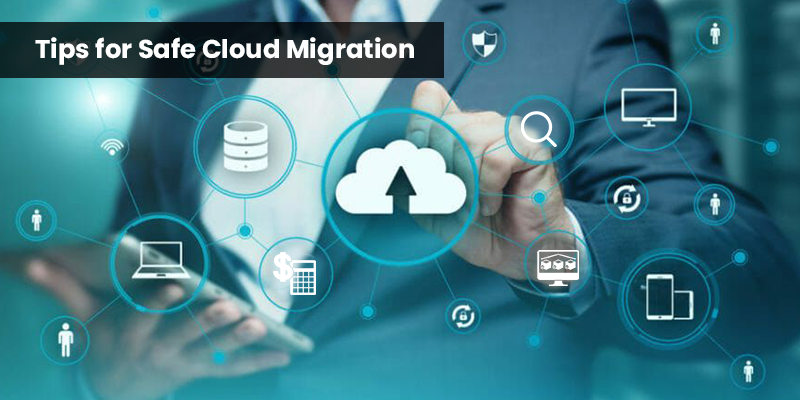
Safe Cloud Migration Tips for CPAs and SMBs in 2025
Businesses are heading towards cloud, the rise of cloud technology has made it easier and more accessible than before. Not to mention, it is cheaper and more sustainable compared to other storage options out there.
In fact, IDG’s 2020 Computing Study shows that 92% of the business’ IT environments are at least somewhat in the cloud today , with only 8% still on-premise.
However, the idea of migrating toward cloud technology is much easier said than done. Anything can go wrong if you do it without proper planning beforehand. This is especially true if you’re planning to shift to a cloud-based accounting system. As there is a lot of sensitive data gathered from your accounting software. Thus, you must ensure everything is safe and secured before migrating it onto the cloud. In this way, you’re confident that your data remains uncompromised while making it more accessible and flexible than ever.
Necessary Tips that are Needed for Cloud Migration
One should attain secure cloud migration in order to enjoy cloud technology, here a few cloud migration tips and tricks to help you get through it.
1. Perform an Inventory of your Existing Systems
Whether you’re just starting a small business or a large firm, you have countless data and apps you must keep track of before you can fully commit yourself to cloud migration. In fact, you must have a complete understanding and visibility of your data—its size, sensitivity, and risk profile. Thus, the first step to cloud migration is having an in-depth assessment of your current IT assets and infrastructure.
This is especially needed if you are handling accounting systems. As it contains information about your company’s cash flow and other critical, financial-related documents. Whether you’re planning to migrate your data or accounting apps, you must have everything accounted for.
Building a complete and accurate inventory of your existing data and applications will make it easier for you to determine the best strategy and technology for cloud migration. This also allows you to prioritize which data needs more protection and security when shifting to cloud-based accounting software. And which applications can you seamlessly integrate with cloud technology?
2. Do Your Research
Migrating to the cloud means investing both money and time on the process. And like all other investments, you must do your own due diligence first to make sure that you get your time and money’s worth.
Researching some of the best cloud services out there would help you figure out which one you should choose for your cloud migration. You can also check out the different types of online accounting software to match your requirements. Also, consider checking out software’s compliance standards for your industry and choose accordingly for the safest solution.
3. Create a Solid Plan
Now that you’re done with your inventories and research, it is time that you start formulating a solid plan for your cloud migration. This includes qualifying which data and apps to move, how to do the migration, the timeline, and who will handle the process. Planning ahead would ensure that the migration process would be streamlined and controlled.
Furthermore, this would make it easier for you to backtrack and amend certain parts of your plan in cases of errors or incidents during migration. Having a plan also allows you and everyone who is affected by the migration to prepare accordingly. This means adjusting their workflows to accommodate the possible downtime and training employees on how to use the cloud-based accounting system they would be operating from then on.
4. Encrypt Sensitive Data
There are many benefits to having all your data accessible on the cloud. It gives you the flexibility you need to work anywhere and anytime. Likewise, it makes sharing information more convenient and instantaneous than ever. However, this can also make your data even more vulnerable in turn. By having your accounting software accessible online, malicious groups can find a way to worm into your system.
Therefore, it is prudent that you encrypt your data—especially the sensitive ones—during cloud migration. While most service providers offer encryption options for your data once uploaded into their systems, you must also find a way to encrypt them during the process itself. For this task, you can take advantage of technologies such as cloud encryption gateways or virtual private networks (VPN).
5. Do it One Step at a Time
Doing phased migrations is a great practice to ensure the security of your data. After all, having all your eggs in one basket can lead to severe consequences. In this case, you might end up losing all your data and apps when everything goes wrong during the migration.
Therefore, test the waters before fully committing to importing all your data into a cloud-based accounting system. You can upload them in batches to ensure everything goes smoothly before moving on to the next. Not to mention, it could minimize the impact of downtime, technical issues, or security problems if these ever arise during the initial phase.
Phased migrations also help you to evaluate the success and security of your cloud host’s systems. This helps you decide better if you should push through with the migration or should take more more time to choose among other suitable software for your business finances.
6. Keep a Safety Net on Hand
Problems and issues can arise from anywhere. Even the best-laid plans can go awry. Therefore, it is important that you have safety nets on hand in case you encounter some unexpected incidents during your cloud migration.
You can take many precautionary steps to ensure that you have something to fall into during such circumstances. Backing up your data and apps, for one, is the best way to have a safety net. In this way, if your cloud migration crashes and all files are corrupted, you can still access your backups and recover all your data and apps in no time.
You can also arrange for extra IT support during the entire procedure. Having an expert oversee your cloud migration can help make sure that things go smoothly, and issues are resolved quickly.
7. Add Layers of Protection
According to Ermetic, nearly 80% of companies had experienced at least one cloud data breach in the past year.
This goes to show that danger continues to lurk out there despite all the security measures that come along with your cloud service provider. Hence, it is important that you add another layer of protection to your cloud accounting software through a two-step verification process.
This method would let you use another device or software to authenticate each login into your system. It would also notify you of any login incidents through your emails or SMS. In this way, you can monitor and keep track of any wanted or unwanted access to your data and applications. Other optional protection you can use is securing your own wireless connections, installing VPNs, fortifying firewalls, and more.
Braving the New World of Accounting
With the rise of cloud technology, cloud accounting is revolutionizing the CPA practice. It helps businesses operate smoothly, flexibly, and with more agility during these fast-changing times. Most importantly, it allows practitioners to embrace the digital age with open arms and fully take advantage of what technology has to offer for their profession.
There are various cloud-based accounting software examples out there that can help your business migrate its finance operations onto the cloud. Just keep in mind these tips, and you’ll be guaranteed a successful and secured cloud migration in the process.
 written by
written byAbout Author






